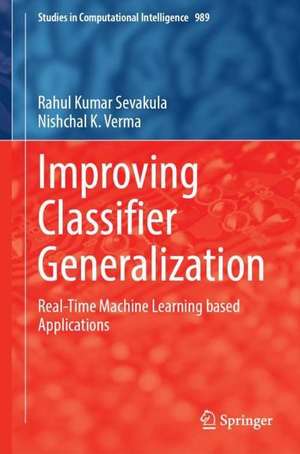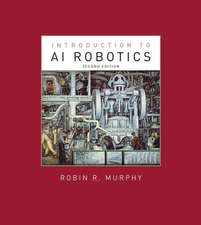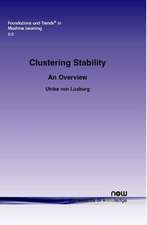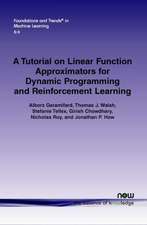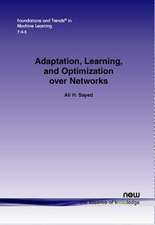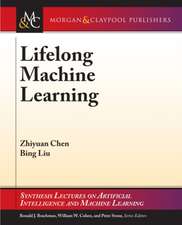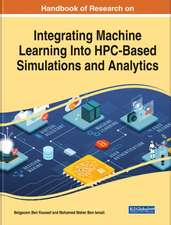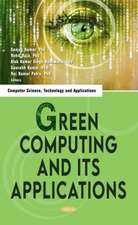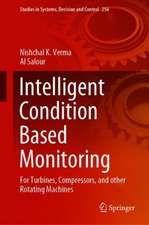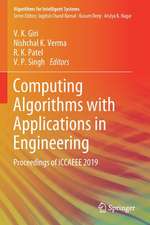Improving Classifier Generalization: Real-Time Machine Learning based Applications: Studies in Computational Intelligence, cartea 989
Autor Rahul Kumar Sevakula, Nishchal K. Vermaen Limba Engleză Hardback – 30 sep 2022
| Toate formatele și edițiile | Preț | Express |
|---|---|---|
| Paperback (1) | 865.83 lei 38-44 zile | |
| Springer Nature Singapore – 2 oct 2023 | 865.83 lei 38-44 zile | |
| Hardback (1) | 988.32 lei 3-5 săpt. | |
| Springer Nature Singapore – 30 sep 2022 | 988.32 lei 3-5 săpt. |
Din seria Studies in Computational Intelligence
- 20%
 Preț: 449.37 lei
Preț: 449.37 lei - 20%
 Preț: 1158.26 lei
Preț: 1158.26 lei - 20%
 Preț: 986.66 lei
Preț: 986.66 lei - 20%
 Preț: 1452.76 lei
Preț: 1452.76 lei - 20%
 Preț: 168.78 lei
Preț: 168.78 lei - 18%
 Preț: 1112.30 lei
Preț: 1112.30 lei - 20%
 Preț: 565.38 lei
Preț: 565.38 lei - 20%
 Preț: 649.28 lei
Preț: 649.28 lei - 20%
 Preț: 1047.73 lei
Preț: 1047.73 lei - 20%
 Preț: 1578.96 lei
Preț: 1578.96 lei - 20%
 Preț: 643.50 lei
Preț: 643.50 lei - 20%
 Preț: 657.49 lei
Preț: 657.49 lei - 20%
 Preț: 993.28 lei
Preț: 993.28 lei - 20%
 Preț: 990.80 lei
Preț: 990.80 lei - 20%
 Preț: 989.96 lei
Preț: 989.96 lei - 20%
 Preț: 1165.69 lei
Preț: 1165.69 lei - 20%
 Preț: 1444.52 lei
Preț: 1444.52 lei - 20%
 Preț: 1041.96 lei
Preț: 1041.96 lei - 20%
 Preț: 1047.73 lei
Preț: 1047.73 lei - 20%
 Preț: 1046.06 lei
Preț: 1046.06 lei - 18%
 Preț: 2500.50 lei
Preț: 2500.50 lei - 20%
 Preț: 989.13 lei
Preț: 989.13 lei - 20%
 Preț: 1165.69 lei
Preț: 1165.69 lei - 20%
 Preț: 1164.05 lei
Preț: 1164.05 lei - 20%
 Preț: 1042.79 lei
Preț: 1042.79 lei - 20%
 Preț: 1460.19 lei
Preț: 1460.19 lei - 18%
 Preț: 1403.52 lei
Preț: 1403.52 lei - 18%
 Preț: 1124.92 lei
Preț: 1124.92 lei - 20%
 Preț: 1039.47 lei
Preț: 1039.47 lei - 20%
 Preț: 1008.11 lei
Preț: 1008.11 lei - 20%
 Preț: 1045.25 lei
Preț: 1045.25 lei - 20%
 Preț: 1275.42 lei
Preț: 1275.42 lei - 20%
 Preț: 1040.32 lei
Preț: 1040.32 lei - 20%
 Preț: 988.32 lei
Preț: 988.32 lei - 20%
 Preț: 1169.79 lei
Preț: 1169.79 lei - 20%
 Preț: 1162.37 lei
Preț: 1162.37 lei - 20%
 Preț: 1059.26 lei
Preț: 1059.26 lei - 20%
 Preț: 1164.05 lei
Preț: 1164.05 lei - 20%
 Preț: 1166.52 lei
Preț: 1166.52 lei - 20%
 Preț: 1459.38 lei
Preț: 1459.38 lei - 18%
 Preț: 1005.74 lei
Preț: 1005.74 lei - 20%
 Preț: 997.38 lei
Preț: 997.38 lei - 20%
 Preț: 1055.94 lei
Preț: 1055.94 lei - 20%
 Preț: 1284.47 lei
Preț: 1284.47 lei - 20%
 Preț: 994.08 lei
Preț: 994.08 lei - 20%
 Preț: 1048.72 lei
Preț: 1048.72 lei - 20%
 Preț: 1066.02 lei
Preț: 1066.02 lei - 20%
 Preț: 943.78 lei
Preț: 943.78 lei - 20%
 Preț: 1173.10 lei
Preț: 1173.10 lei - 20%
 Preț: 1457.72 lei
Preț: 1457.72 lei
Preț: 988.32 lei
Preț vechi: 1235.41 lei
-20% Nou
Puncte Express: 1482
Preț estimativ în valută:
189.11€ • 197.98$ • 156.48£
189.11€ • 197.98$ • 156.48£
Carte disponibilă
Livrare economică 15-29 martie
Preluare comenzi: 021 569.72.76
Specificații
ISBN-13: 9789811950728
ISBN-10: 9811950725
Pagini: 166
Ilustrații: XXIII, 166 p. 53 illus., 45 illus. in color.
Dimensiuni: 155 x 235 mm
Greutate: 0.45 kg
Ediția:1st ed. 2023
Editura: Springer Nature Singapore
Colecția Springer
Seria Studies in Computational Intelligence
Locul publicării:Singapore, Singapore
ISBN-10: 9811950725
Pagini: 166
Ilustrații: XXIII, 166 p. 53 illus., 45 illus. in color.
Dimensiuni: 155 x 235 mm
Greutate: 0.45 kg
Ediția:1st ed. 2023
Editura: Springer Nature Singapore
Colecția Springer
Seria Studies in Computational Intelligence
Locul publicării:Singapore, Singapore
Cuprins
Introduction to classification algorithms.- Methods to improve generalization performance.- MVPC – a classifier with very low VC dimension.- Framework for reliable fault detection with sensor data.- Membership functions for Fuzzy Support Vector Machine in noisy environment.- Stacked Denoising Sparse Autoencoder based Fuzzy rule classifiers.- Epilogue.
Notă biografică
Dr Sevakula Rahul Kumar has over 10 years of research experience in machine learning (ML) and deep learning (DL). He received his Bachelor’s degree from the National Institute of Technology (NIT) Warangal, India in 2009 and later his Ph.D. degree from the Indian Institute of Technology (IIT) Kanpur, India in 2017. He is currently a Sr. Research Scientist at Whoop, and his research interests lie at the intersection of ML, physiological signals, cardiovascular health monitoring (medicine) and wearables. Prior to joining Whoop, he was an Instructor (junior research faculty) at Harvard Medical School and Massachusetts General Hospital, USA, and a Data Scientist at IBM India. He has filed multiple patent disclosures and has published over 45 research papers in international peer-reviewed journals and conferences. He is also a reviewer for several journals of national and international repute.
Dr. Nishchal K. Verma is a Professor in the Department of Electrical Engineering at Indian Institute of Technology (IIT) Kanpur, India. Dr. Verma's research interest falls in Artificial Intelligence (AI) related theories and its practical applications to inter-disciplinary domains like machine learning, deep learning, computer vision, prognosis and health management, bioinformatics, cyber-physical systems, complex and highly non-linear systems modeling, clustering, and classifications, etc. He has published more than 250 research papers in peer-reviewed reputed conferences and journals along with 4 books (edited/ co-authored) in the field of AI. He has 20+ years of experience in the field of AI. He is currently serving as Associate Editor/ Editorial Board Member of various reputed journals and conferences. He has also developed several AI-related key technologies for The BOEING Company, USA.
Dr. Nishchal K. Verma is a Professor in the Department of Electrical Engineering at Indian Institute of Technology (IIT) Kanpur, India. Dr. Verma's research interest falls in Artificial Intelligence (AI) related theories and its practical applications to inter-disciplinary domains like machine learning, deep learning, computer vision, prognosis and health management, bioinformatics, cyber-physical systems, complex and highly non-linear systems modeling, clustering, and classifications, etc. He has published more than 250 research papers in peer-reviewed reputed conferences and journals along with 4 books (edited/ co-authored) in the field of AI. He has 20+ years of experience in the field of AI. He is currently serving as Associate Editor/ Editorial Board Member of various reputed journals and conferences. He has also developed several AI-related key technologies for The BOEING Company, USA.
Textul de pe ultima copertă
This book elaborately discusses techniques commonly used to improve generalization performance in classification approaches. The contents highlight methods to improve classification performance in numerous case studies: ranging from datasets of UCI repository to predictive maintenance problems and cancer classification problems. The book specifically provides a detailed tutorial on how to approach time-series classification problems and discusses two real time case studies on condition monitoring. In addition to describing the various aspects a data scientist must consider before finalizing their approach to a classification problem and reviewing the state of the art for improving classification generalization performance, it also discusses in detail the authors own contributions to the field, including MVPC - a classifier with very low VC dimension, a graphical indices based framework for reliable predictive maintenance and a novel general-purpose membership functions for Fuzzy Support Vector Machine which provides state of the art performance with noisy datasets, and a novel scheme to introduce deep learning in Fuzzy Rule based classifiers (FRCs). This volume will serve as a useful reference for researchers and students working on machine learning, health monitoring, predictive maintenance, time-series analysis, gene-expression data classification.
Caracteristici
Includes a special chapter on methods to improve generalization performance during classification Case studies provide a "how to" for improving classification performance on numerous types of problems Includes step by step tutorial on how to approach and solve condition monitoring problems
